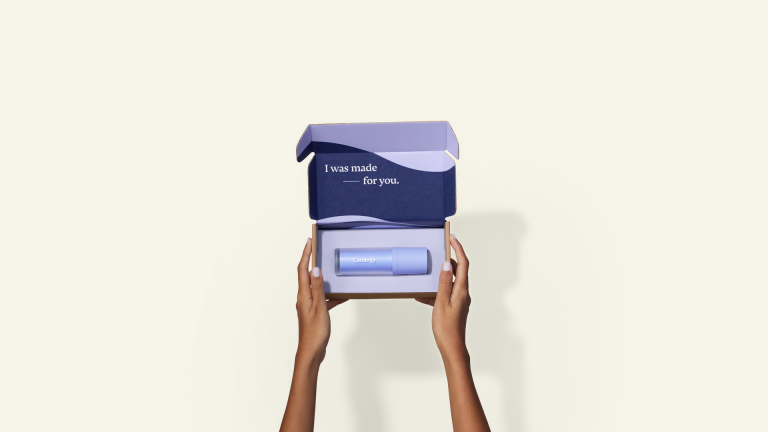How it works:
Share your skin goals and snap selfies
Your dermatology provider prescribes your formula
Apply nightly for happy, healthy skin
How it works:
How it works:
Share your skin goals and snap selfies
Your dermatology provider prescribes your formula
Apply nightly for happy, healthy skin
How it works:
The “glass skin” routine: What the experts say
These skincare steps will help you achieve a soft, smooth look.



Another social media skincare trend is on the scene: The Korean “glass skin” routine. The term refers to skin that’s as smooth and clear as glass—hence the name. It’s a look that almost seems poreless.
As much as we like smooth skin, our pros want to remind you that we all have pores, and there’s nothing wrong with it. Erasing them is impossible, but if you want to reduce their appearance, a dedicated daily skincare routine may help you do so. Here’s more about the “glass skin” trend and the steps to help achieve the look.
Because “glass skin” is not a medical term, here at Curology, we believe it shouldn’t be used as a measure of skin health. Everyone’s skin is unique—the best way to get advice on what’s best for you is to talk to your dermatology provider.
What is “glass skin”?
“Glass skin” is a trend with roots in Korean skincare. It’s popular among many K-Pop stars, and if you’re on TikTok, chances are you’ve seen it there, too.
While the fad is all about achieving skin that appears poreless, it’s important to remember that we all have pores, even pop stars. Pore size varies from person to person, but there are some skincare options available for making them appear smaller (if that’s what you desire).
10 steps to help you achieve “glass skin”
Many “glass skincare” routines involve 10 steps and require dedication over weeks or months. Here at Curology, we advocate a simple, three-step skincare routine and often tell our patients that a longer routine is totally optional. In fact, it’s often unnecessary and may even cause damage if you’re not choosing products that suit your skin and layering them correctly. However, many fans of the “glass skin” look recommend following these steps:
Cleanse with oil: Use an oil cleanser to remove dirt and makeup from your face.
Cleanse with face wash: Cleanse your face a second time using your favorite gentle face wash.
Exfoliate: Exfoliate two to three times per week using a chemical exfoliant like salicylic acid or glycolic acid. This removes dead skin cells from your skin’s surface.¹ Physical exfoliation is another option, but facial scrubs tend to be too harsh for daily use.
Apply toner: Mist or swipe your face with toner. We recommend using a hydrating formula.
Use serums or essences: Layer on hydrating serums or essences (or both) as another moisturizing step in your routine.
Use an eye cream: Hydrate the delicate skin around your eyes with a cream or serum designed for this area.
Moisturize: Apply a rich moisturizer to help prevent dry, cracked skin.² For moisturizing in the morning, you can use a product that includes SPF protection.
Add a face oil: Seal all your products with a nourishing face oil as part of your morning skincare routine.
Try a mask: Use a hydrating sheet mask a few times a week (or daily!) to help give your skin an added moisture boost.
Don’t forget your SPF: Every morning, finish your routine by applying broad-spectrum sunscreen with at least SPF 30 to protect against sun damage.
Factors that may influence your skin
If you decide to try a “glass skin" routine, it’s essential to know that factors outside your skincare steps and products may influence your results. For your skin to look its healthiest, you need to care for the rest of your body, too:
Sleep: Poor sleep quality can increase signs of aging, reduce skin barrier function, and may impact how happy you are with your skin’s appearance.³
Exercise: Getting out and staying active boosts oxygen flow throughout your body.
Diet: Eating a healthy, balanced diet filled with plenty of fruits and veggies helps give your skin (and whole body!) the vitamins, minerals, and nutrients it craves.
Sun protection: We’re all about staying out of the sun! In addition to sunscreen, try to avoid being outdoors when the sun is at its strongest. If you must be outside, seek shade and wear clothing that covers you up.⁴

Try these ingredients
If you’re embarking on a “glass skin” journey, choose skincare products with beneficial ingredients. Science-backed, proven ingredients are a great way to see fundamental changes to your skin over time, and this is why Curology offers personalized prescription formulas containing some of these same ingredients. You may want to try products that contain the following:
Over-the-counter retinol and prescription retinoids
OTC retinol and prescription retinoids like tretinoin are found in many anti-aging products. These potent active ingredients are topical vitamin A derivatives that offer potential benefits like reducing the appearance of fine lines and wrinkles, fading dark spots, improving skin texture, and boosting skin firmness. Retinol and retinoids increase your body’s collagen production and stimulate skin cell turnover for smoother-looking skin.⁵
Vitamin C
Vitamin C has made a name for itself in dermatology. When applied topically, it can help fade dark spots. It may also help protect against the sun and environment and stimulate collagen production.⁶
Hyaluronic acid
A Holy Grail moisturizing ingredient for many dermatology providers, hyaluronic acid helps the skin stay hydrated and dewy. It works by binding to water molecules,⁷ and it can hold 1,000 times its weight in water.⁸ It’s generally great for all skin types, including sensitive skin.
Vitamin B3 (niacinamide)
Niacinamide is another skincare staple that offers powerful results. It may improve the signs of aging like hyperpigmentation, and research shows that this may be attributed to its anti-inflammatory and antioxidant properties.⁹
Sunscreen
Always protect your skin from the sun! Apply a broad-spectrum formula that’s at least SPF 30 every morning—no excuses! If you’re not a fan of chemical sunscreens, you can consider physical sunscreens that contain zinc oxide or titanium dioxide.
Additional considerations for getting “glass skin”
In trying to achieve “glass skin,” you must consider your skin type. In some cases, different skin types may require unique products or extra steps to make the routine work effectively. Here’s how to modify the glass skin routine for your skin type:
Sensitive skin: Choose mild cleansers and products designed for sensitive skin.
Dry skin: If you have dry skin, you may not need to modify this routine since it’s already all about hydration! However, be extra gentle if you decide to incorporate the exfoliation step.
Oily and combination skin: Opt for gentle, foaming cleansers, and you may want to pick products labeled “oil-free” and “non-comedogenic.”¹⁰ Also, don’t skip the face oil—it may seem counterintuitive to add oil to oily skin, but it can actually help regulate your sebum production.
Acne-prone skin: When possible, choose products with acne-fighting ingredients like salicylic acid.
Curology knows skincare trends

Whether you’re looking to learn more about skincare trends like “glass skin” or achieve your own skincare goals, Curology’s got your back. Founded in 2014 by a board-certified dermatologist, we believe everyone’s skin is unique. We offer full-service skincare products made with proven effective ingredients, including those that treat acne, signs of aging, and rosacea. Our experts will help take the guesswork out of your skincare routine by creating a personalized prescription formula to help you tackle skin concerns. Our personalized prescription formulas can include active ingredients like tretinoin, azelaic acid, and niacinamide.
Signing up is easy.* Just answer a few questions and snap some selfies to help us get to know your skin. If Curology is right for you, we’ll pair you with one of our in-house licensed dermatology providers. The best part? You’ll have access to dermatologist-designed products, like our cleanser, moisturizer, or sunscreen.
FAQs
“Glass skin” is a trend with roots in Korean skincare. It’s popular among many K-Pop stars, and if you’re on TikTok, chances are you’ve seen it there, too.
For your skin to look its healthiest, you need to care for the rest of your body, too:
Sleep: Poor sleep quality can increase signs of aging, reduce skin barrier function, and may impact how happy you are with your skin’s appearance.
Exercise: Getting out and staying active boosts oxygen flow throughout your body.
Diet: Eating a healthy, balanced diet filled with plenty of fruits and veggies helps give your skin (and whole body!) the vitamins, minerals, and nutrients it craves.
Sun protection: We’re all about staying out of the sun! In addition to sunscreen, try to avoid being outdoors when the sun is at its strongest.
P.S. We did the homework so you don’t have to:
How to safely exfoliate at home. American Academy of Dermatology. (n.d.).
Spencer, T. Dry skin and skin moisturizers. Clinics in Dermatology. (1988).
Oyetakin-White P., et al. Does poor sleep quality affect skin ageing?Clin Exp Dermatol. (January 2015).
How to pick the right moisturizer for your skin. American Academy of Dermatology. (2022).
Mukherjee S., et al. Retinoids in the treatment of skin aging: an overview of clinical efficacy and safety. Clin Interv Aging. (2006).
Al-Niaimi, F., Chiang, NYZ., Topical Vitamin C and the Skin: Mechanisms of Action and Clinical Applications. (2017).
Sudha, P.N. and Rose, M.H. Chapter Nine - Beneficial effects of hyaluronic acid. Advances in Food and Nutrition Research. (2014).
Your winter skin survival kit.American Academy of Dermatology. (n.d.).
Vlase, L., et al. Mechanistic basis and clinical evidence for the applications of nicotinamide (niacinamide) to control skin aging and pigmentation. Antioxidants. (August 2021).
How to control oily skin.American Academy of Dermatology. (n.d.).
Laura Phelan is a board-certified Family Nurse Practitioner at Curology. She earned her Masters of Science in Nursing at Benedictine University and went on to get her post-master’s certificate as a Family Nurse Practitioner at the University of Cincinnati.
* Subject to consultation. Subscription is required. Results may vary.

Curology Team

Laura Phelan, NP-C